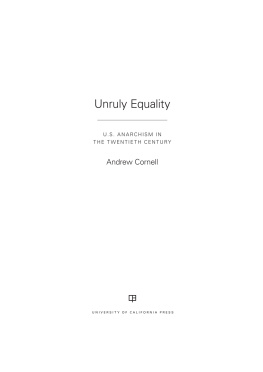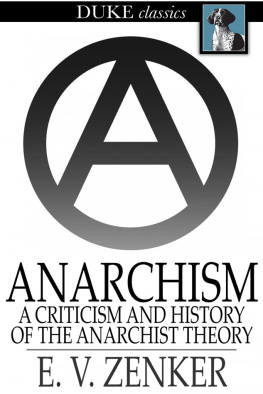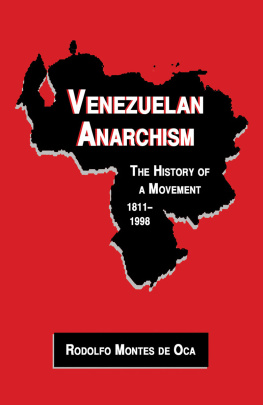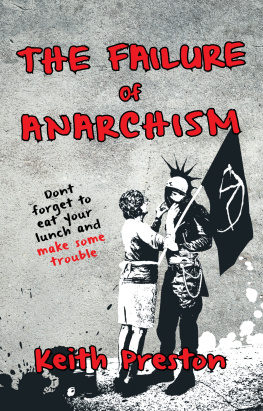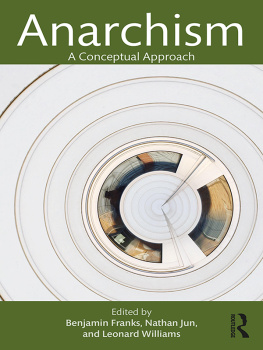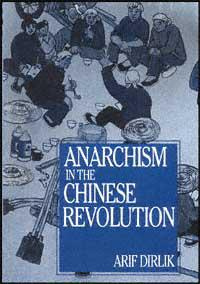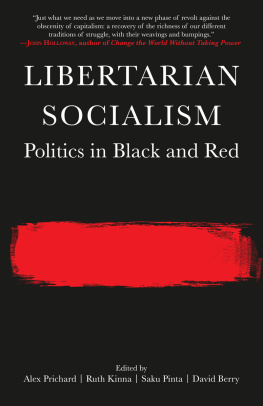The publisher gratefully acknowledges the generous support of the Valerie Barth and Peter Booth Wiley Endowment Fund in History of the University of California Press Foundation.
Unruly Equality
U.S. ANARCHISM IN THE TWENTIETH CENTURY
Andrew Cornell

UNIVERSITY OF CALIFORNIA PRESS
University of California Press, one of the most distinguished university presses in the United States, enriches lives around the world by advancing scholarship in the humanities, social sciences, and natural sciences. Its activities are supported by the UC Press Foundation and by philanthropic contributions from individuals and institutions. For more information, visit www.ucpress.edu.
University of California Press
Oakland, California
2016 by The Regents of the University of California
Library of Congress Cataloging-in-Publication Data
Cornell, Andrew, 1977 author.
Unruly equality : U.S. anarchism in the twentieth century / Andrew Cornell.
pages cm
Includes bibliographical references and index.
ISBN 978-0-520-28673-3 (cloth : alk. paper)
ISBN 978-0-520-28675-7 (pbk. : alk. paper)
ISBN 978-0-520-96184-5 (ebook)
1. AnarchismUnited StatesHistory20th century. I. Title. II. Title: U.S. anarchism in the twentieth century.
HX 843. C 667 2016
335.8309730904dc23
2015022451
Manufactured in the United States of America
24 23 22 21 20 19 18 17 16
10 9 8 7 6 5 4 3 2 1
In keeping with a commitment to support environmentally responsible and sustainable printing practices, UC Press has printed this book on Natures Natural, a fiber that contains 30% post-consumer waste and meets the minimum requirements of ANSI/NISO Z 39.481992 ( R 1997) ( Permanence of Paper ).
For Ellie
I am undertaking something which may turn out to be a rsum of the English speaking anarchist movement in America and I am appalled at the little I know about it after my twenty years of association with anarchists both here and abroad.
W.S. VAN VALKENBURGH
Letter to Agnes Inglis, 1932
From the start, anarchism was an open political philosophy, always transforming itself in theory and practice.... Yet when people are introduced to anarchism today, that openness, combined with a cultural propensity to forget the past, can make it seem a recent inventionwithout an elastic tradition, filled with debates, lessons, and experiments to build on.
CINDY MILSTEIN
Anarchism and Its Aspirations, 2010
Librarians have an academic sense, and cant bear to throw anything away! Even things they dont approve of. They acquire a historic sense. At the time a hand-bill may be very bad! But the following day it becomes historic.
AGNES INGLIS
Letter to Highlander Folk School, 1944
To keep on repeating the same attempts without an intelligent appraisal of all the numerous failures in the past is not to uphold the right to experiment, but to insist upon ones right to escape the hard facts of social struggle into the world of wishful belief. We grant such a right to the weak, the infirm, to the tired radical, to the escapists. But we do deny such a right to the revolutionary whose main weapon is an unflagging will and an unblunted sense of reality.
Vanguard: A Libertarian Communist Journal, 1934
CONTENTS
TABLES AND FIGURES
TABLES
FIGURES
ACKNOWLEDGMENTS
This book has been a long time in the making, and I am grateful to many people who have helped me along the way. The first time that I can recall contemplating anarchism was as a thirteen-year-old skateboarding protopunk attempting to decipher the lyrics to the Dead Kennedys album Bedtime for Democracy. I was fortunate to take part in the politicized punk, hardcore, and riot grrl music scenes of 1990s, which provided me with an ethical compass and taught me much about feminism, antiracism, imperialism, and queer liberation. Anarchism was always part of the mix in these overlapping communities of writers, activists, and musicians, but even as a teenager I sensed the relationship between punk and anarchism to be a complex one. As I began to study anarchism more assiduously, I found that the histories of anarchism available to me generally concluded in the 1920s, after Emma Goldman was deported from the United States. Yet I knew of, and counted myself part of, a contemporary international anarchist-punk movement that was symbolized, for me, by the British band and political collective Crass. For years, I searched for a book that would tell the history of anarchism in a way that helped me connect the dots between Emma Goldman and Crass. Eventually I realized that no one had written such a book, and that, in line with a core tenet of punk, I should do it myself. I therefore owe an enormous debt of gratitude to all the hardcore kids and zine writers who set me on this path. I particularly want to recognize the Basement Children crew, in Chicago, and the residents of 425 Davis Street, in Kalamazoo, who opened many important vistas for me.
I first conceptualized this book project when, in the months after the 1999 Battle of Seattle, it became clear that neither journalists nor academics understood the roots of contemporary anarchism. At that moment, it seemed that a historical explanation of the goals, tactics, and organizational forms of what were being called the new anarchists would help cement the emerging coalition of global-justice activists and, thereby, contribute to far-reaching social change. I, of course, had no clue how massive a project I was undertaking, how long it would take to come to fruition, and how many things would change in the meantime. I would not have attended those life-changing demonstrations in Seattle had I not been involved with Students Organizing for Labor and Economic Equality as an undergraduate at the University of Michigan. Nor would I have known about the resources available for reconstructing the history of twentieth-century anarchism had Julie Herrada not befriended me and nurtured my love of archives during the years I held a work-study position at the University of Michigans Labadie Collection. I am touched that Julie has encouraged me in this project and served as a sounding board for my ideas for nearly twenty years.
The book began as a dissertation in the Program in American Studies at New York University. My stellar dissertation committeeAndrew Ross, Lisa Duggan, Nikhil Pal Singh, Stephen Duncombe, and Randy Martinnot only taught me crucial concepts and the craft of research but also modeled the art of remaining engaged scholar activists. Randy Martin was one of the friendliest and most humbly brilliant people I have known, and he will be greatly missed. Neil Brenner, Jennifer Morgan, and Madala Hillaire also improved my time at NYU markedly.
Among the many brilliant students I collaborated with and learned from at NYU are several that I especially want to thank: Andr Carrington, Miles Grier, Dawn Peterson, Miabi Chatterji, Emily Thuma, Rich Blint, Zach Schwartz-Weinstein, Johana Londoo, Steve Fletcher, Stuart Schrader, Christy Thornton, Marisol Lebrn, Jenny Kelly, Vivek Bald, Elizabeth Mesok, Zenia Kish, and Michael Palm. It was a privilege to work with the Graduate Student Organizing Committee, Grad/Undergrad Solidarity, and the Left Turn magazine collective during my years in New York. Jessica Harbaugh provided invaluable levity, insight, and emotional support over the long years during which I was crafting the dissertation and the book proposal. I will be forever grateful to Francis Feeley for bringing me to the Universit Stendhal, welcoming me into his home, and engaging with my ideas. I also am appreciative of the Williams College American Studies Program, especially Mrida Ra, Robin Keller, and Dorothy Wang, for their friendly collegiality during the year I spent as a visiting professor in Williamstown.

